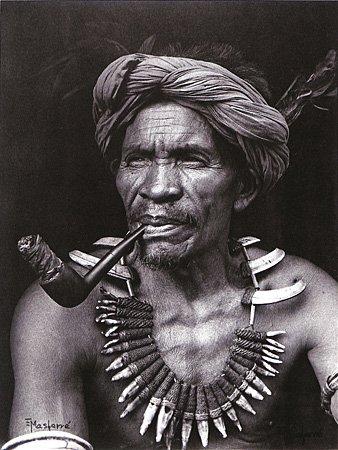Cultural Center of the Philippines
ENCYCLOPEDIA OF
PHILIPPINE ART
Lakay Kabayo
1950 / Black-and-white print / Artist: Eduardo Masferre
The portraits of self-taught photographer Masferre are characterized by a deep understanding of his subject matter and a strong appreciation for the value of Cordilleran culture. The esteemed elder in this photograph is dressed in ceremonial finery, which includes a bayuyok or feather ornament for the headdress; langat or turban; tangkil or boar’s tooth armband; and buaya or necklace of rattan and the teeth of a boar, dog, crocodile—animals honored for their courage and strength.
Masferre depicts his subjects in a way that celebrates the beauty that comes from the dignity of the ordinary. His photos are not anthropological documentation but works of art because he captures the emotion unique to the individuality of his subjects and expresses his own aesthetic response to what he sees.
Lakay Kabayo is a closed composition. Masferre intentionally draws the viewer’s eyes into the composition, keeping it within the frame’s major focal area. One looks directly between the eyes of Kabayo, as if one were sitting across the elder, also enjoying a pipe in the Bontok community.
The photographer almost fills the frame fully with his subject. By maintaining a background of darkness, Masferre allows the human figure to dominate. His image acquires the powerful solidity and immovability characteristic of a classic triangular composition. Although a soft, three-quarter natural light illuminates the subject, the portrait is characterized by a control of tonality. His use of a strong contrast between dark and light imbues the black-and-white portrait with characteristic vitality and directness. The keen handling of illumination does not only provide textural reality (as in the skin, fabric, and weaving on the necklace) and strength of character; it also adds human warmth, making the photograph exude a feeling of realism.
Written by Felice P. Sta. Maria
